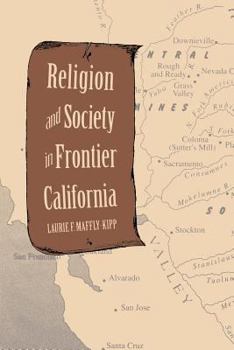Religion and Society in Frontier California
(Part of the Yale Historical Publications Series Series)
Select Format
Select Condition 
Book Overview
The chaotic and reputedly immoral society of the California mining frontier during the gold rush period greatly worried Protestant evangelicals from the Northeast, and they soon sent missionaries westward to transplant their religious institutions, beliefs, and practices in the area. This book tells the story of that enterprise, showing how it developed, why it failed, and what patterns of religious adherence evolved in the West in place of evangelical Protestantism. Laurie Maffly-Kipp begins by analyzing the eastern-based religious ideology that underlay the movement westward and by investigating the motives behind the founding of home mission boards dedicated to the spread of Christianity and civility among new settlers. Drawing on the diaries, letters, and journals of hundreds of California "argonauts," Maffly-Kipp describes those missionaries and their wives sent to California after 1848 and the virtually all-male mining society that resisted the missionaries' notions of moral order and in turn created new religious beliefs and practices. Maffly-Kipp argues that despite its alleged immorality, the California gold rush was actually one of the most morally significant events of the nineteenth century, for it challenged and brought into conflict the cherished values of antebellum American culture: a commitment to spiritual and social progress; a concern with self-discipline, moral character, and proper gender roles; and a thirst for wealth fostered by the spirit of free enterprise.
Format:Paperback
Language:English
ISBN:0300206445
ISBN13:9780300206449
Release Date:November 2013
Publisher:Yale University Press
Length:252 Pages
Weight:0.86 lbs.
Dimensions:0.6" x 6.1" x 9.2"
Customer Reviews
1 rating
A good book for the right audience
Published by Thriftbooks.com User , 15 years ago
Based on the author's dissertation, the book is a scholarly study of the American Home Missions Society's efforts to send ministers to Gold-Rush California to establish Protestant churches there as a counter to the disorder in the new state. The author concludes that booming California turned out to be a new and different environment in which old evangelizing techniques so successful in the farming Midwest did not work. Missionaries tried to explain this to their superiors in the east, who were slow to appreciate California's unique Gold Rush society, and missionaries were on their own to come up with new ways to appeal to their California audience. Those looking for an entertaining popular history of the Rush will be disappointed, but scholars of the West or of religious history, the intended audience, will find it a solid study. History enthusiasts wishing to delve deep into 19th-century religious history or Western history may find it of interest also, as it is not turgid in style.






